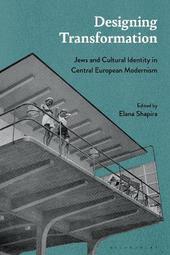
|
Designing Transformation: Jews and Cultural Identity in Central European Modernism
Hardback
Main Details
| Title |
Designing Transformation: Jews and Cultural Identity in Central European Modernism
|
| Authors and Contributors |
Edited by Elana Shapira
|
| Physical Properties |
| Format:Hardback | | Pages:344 | | Dimensions(mm): Height 234,Width 156 |
|
| Category/Genre | Art and design styles - Modernist design and Bauhaus |
|---|
| ISBN/Barcode |
9781350172272
|
| Classifications | Dewey:720.943 |
|---|
| Audience | | Tertiary Education (US: College) | |
|---|
| Illustrations |
69 bw illus
|
|
Publishing Details |
| Publisher |
Bloomsbury Publishing PLC
|
| Imprint |
Bloomsbury Visual Arts
|
| Publication Date |
26 August 2021 |
| Publication Country |
United Kingdom
|
Description
Jewish designers and architects played a key role in shaping the interwar architecture of Central Europe, and in the respective countries where they settled following the Nazi's rise to power. This book explores how Jewish architects and patrons influenced and reformed the design of towns and cities through commercial buildings, urban landscaping and other material culture. It also examines how modern identities evolved in the context of migration, commercial and professional networks, and in relation to the conflict between nationalist ideologies and international aspirations in Central Europe and beyond. Pointing to the production within cultural platforms shared by Jews and Christians, the book's research sheds new light on the importance of integrating Jews into Central European design and aesthetic history. Leading historians, curators, archivists and architects present their critical analyses further to 'design' the past and push forward a transformation in the historical consciousness of Central Europe. By reconsidering the seminal role of Central European emigre and exiled architects and designers in shaping today's global design cultures, this book further strengthens humanistic, progressive and pluralistic cultural trends in Europe today.
Author Biography
Elana Shapira is a cultural and design historian. She is the Project Leader of the Austrian Science Fund research project "Visionary Vienna: Design and Society 1918-1934" and Lecturer in Design History and Theory at the University of Applied Arts Vienna, Austria.
ReviewsOne of the vivid threads that binds this collection together has to do with the erasures of history. Here, however we are faced with compelling evidence that in the major centers of interwar Central Europe, Jews were in the vanguard of the new urbanism and contributed to the remaking of these historical cities at an astounding level that has not yet been given the recognition it deserves. The conclusion we can draw from this is that for almost a century our understanding of European architectural modernism has been narrow, racist, and impoverished; this book is a bugle call for change. * Journal of Design History * Designing Transformation presents a wealth of new research on the multi-faceted involvement of Jewish architects, designers, writers and patrons in Central European Modernism. Wide ranging and thoughtfully framed, the collection demonstrates the centrality and complexity of Jewish production and co-production of the modern city, home and collective consciousness. And it offers a provocative challenge to understand and mark the importance of this contribution to the contemporary European city. -- Leslie Topp, Professor of Architectural History, Birkbeck, University of London, UK Elana Shapira's Designing Transformation breaks new ground in its intricate and nuanced examination of the Jewishness of Central European modernism. Its essays reveal how the negotiation of Jewish difference, visibility, and belonging, how processes of Jewish acculturation and mobility imprinted the urban landscapes of the former Habsburg empire in the interwar period and global sites of forced emigration in the 1930s and 40s. The volume encompasses a wide range of well-known and obscure figures who responded to twentieth-century crises and opportunities with artistic innovation and dazzling creativity. -- Paul Lerner, Professor of History and Director of the Max Kade Institute for Austrian-German-Swiss Studies, University of Southern California, USA This volume offers an array of expertly-researched, insightful essays on a breathtaking number of Central European Jewish designers, architects, artisans and artists. It is a vital resource for anyone seeking to expand their knowledge of Jews' participation in the built environment and visual culture in the modern era. -- Lisa Silverman, Associate Professor of History and Jewish Studies, University of Wisconsin-Milwaukee, USA This important volume complicates our understanding of modernism by shedding light on a significant but overlooked period of production through the lens of identity. Rather than a single view, this lens offers multiple visions and rich, complex accounts about both known and little-known works and designers. Particularly welcome are the authors' even-handed treatments of modernism in all its permutations from the most rigorously functionalist to those informed by tradition and folk-culture. -- Timothy M. Rohan, Associate Professor, American and European Architecture, University of Massachusetts Amherst, USA This volume is the first to comprehensively examine the productive role of modern Jewish designers and architects in Central Europe within the horizon of emancipation, participation and dislocation. Elana Shapira has succeeded in bringing together distinguished authors from different disciplines and geographies. Designing Transformation thus formulates multiple perspectives and presents an impressive tableau of topics and approaches. -- Burcu Dogramaci, Professor of Art History, Ludwig Maximilian University of Munich, Germany Designing Transformation marks a highly important stage in the overdue acknowledgement of Jewish architects, designers and patrons in shaping Central European Modernism. Through ground-breaking research, the collected essays offer ways to understand the diverse circumstances of Jews, how their Modernism was far from homogenous, and that their negotiation of cultural authorship was central to their status, identity and survival. -- Jeremy Aynsley, Professor of Design History, University of Brighton, UK
|